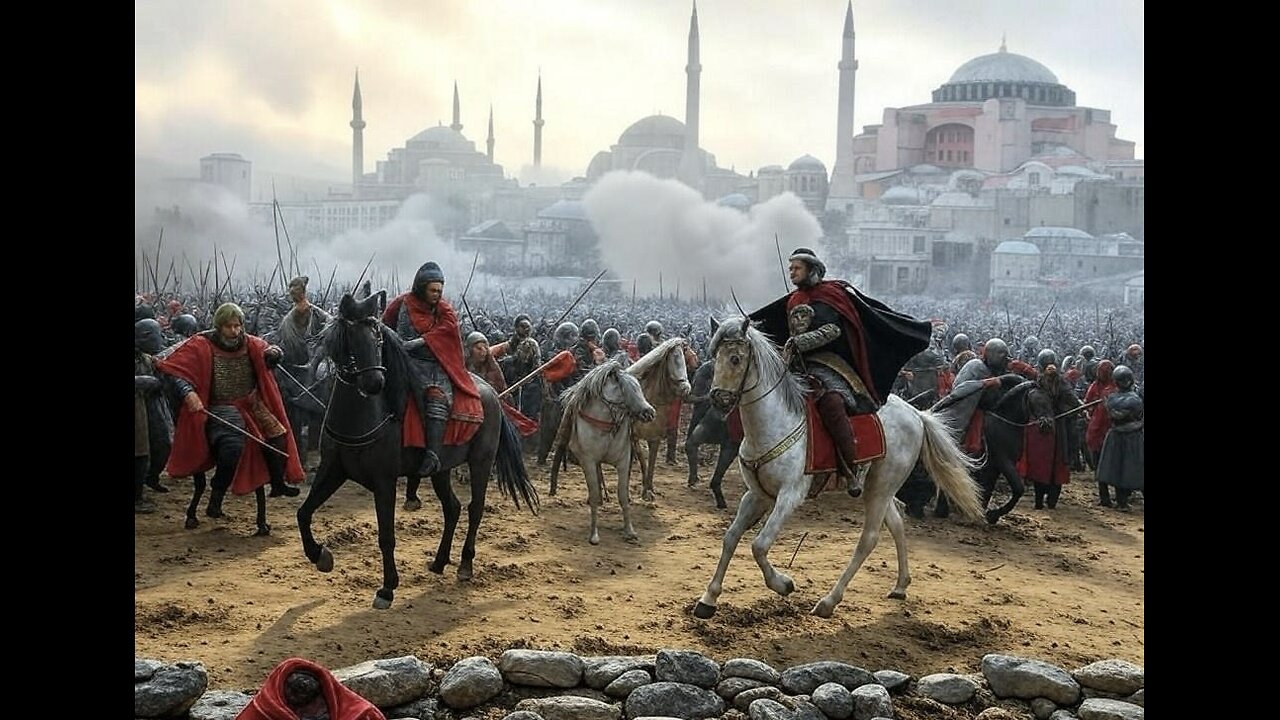Premium Only Content

The fall of Constantinople
The fall of Constantinople, which occurred on May 29, 1453, was a pivotal event marking the end of the Byzantine Empire and the rise of the Ottoman Empire as a major power in Europe and the Near East. Here's a concise description of the event:
The Fall of Constantinople (1453):
- Background: Constantinople, once the grand capital of the Eastern Roman (Byzantine) Empire, had been in decline for centuries due to internal strife, economic troubles, and repeated sieges by various powers. By 1453, it was a shadow of its former glory, with a significantly reduced population and weakened defenses.
- The Siege: The Ottoman Sultan Mehmed II, known as "Mehmed the Conqueror," launched a massive siege on Constantinople. His army, equipped with new technology like large cannons, including the famous "Basilica" cannon, besieged the city. The siege lasted for nearly two months, with several unsuccessful attempts to breach the walls until the final assault.
- The Attack: On the morning of May 29, 1453, after intense bombardment, Ottoman forces managed to breach the walls near the Gate of St. Romanus. Despite fierce resistance, the city's defenders, led by Emperor Constantine XI, were overwhelmed by the sheer numbers and strategic prowess of the Ottoman troops.
- The Capture: Constantine XI died during the battle, and Constantinople fell to the Ottomans. The event is often remembered for the brutal sack of the city that followed, although Mehmed II quickly moved to restore order, converting the Hagia Sophia into a mosque and repopulating the city to reestablish it as the Ottoman capital.
- Consequences:
- Political: The fall of Constantinople ended the Byzantine Empire, which had lasted over 1,000 years. It cemented Ottoman control over the eastern Mediterranean and established Istanbul (renamed from Constantinople) as a major cultural and political center.
- Religious: The event marked a significant shift in the religious landscape, with Islam becoming more dominant in the region. The conversion of Hagia Sophia symbolized this change.
- Cultural: The influx of Greek scholars to the West before and after the fall contributed to the Renaissance, bringing with them ancient texts and knowledge.
- Legacy: This event has been seen through various lenses over time - as a tragic loss for Christendom by some, a glorious conquest by others, and universally as a turning point in world history.
The fall of Constantinople is not just a military event but a profound cultural and historical shift, influencing the course of European, Middle Eastern, and global history.
-
 LIVE
LIVE
Joker Effect
1 hour agoJoker Talks with his Community about 2026... and reviews Streamers. !Shock
330 watching -
 LIVE
LIVE
Joey Cannoli
2 hours agoJoey Cannoli games: God of War Ragnarok Berserker Battles! Tyr! non arc raider stream, repo later
76 watching -
 3:02:14
3:02:14
Barry Cunningham
3 hours agoLive NOW..Re Start
151K35 -
 33:23
33:23
Selwen
6 days agoWhy Video Game Prices Don't Make Sense Anymore
18 -
 LIVE
LIVE
Flyover Conservatives
21 hours agoYour Miracle Season Has Begun: Breakthrough, Healing & Destiny Unlocked - Joan Hunter | FOC Show
334 watching -
 2:41:16
2:41:16
Nikko Ortiz
3 hours agoBurkina Faso Looks Very Interesting... | Rumble LIVE
10.7K -
 2:36:10
2:36:10
Mally_Mouse
8 hours ago🎄🎮 Let's Play!!: - Fortnite
11.3K2 -
 52:19
52:19
Donald Trump Jr.
7 hours agoNick Shirley Live , We’re “Learing” More & More | Triggered Ep. 303
143K255 -
 LIVE
LIVE
Saycred Angel Live
6 hours ago!HOUSE😈NO MERCY MONDAY😈!GIVEAWAY
67 watching -
 56:04
56:04
vivafrei
4 hours agoTim Walz Appoints "Outside Firm" to Audit Fraud! DOJ Wants to Detain Brian Cole Jr. PENDING TRIAL!
34.9K43